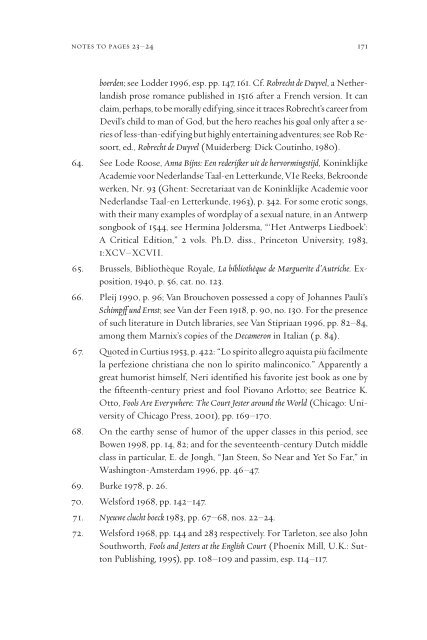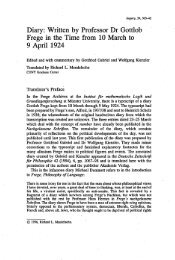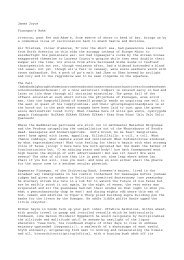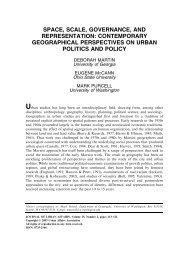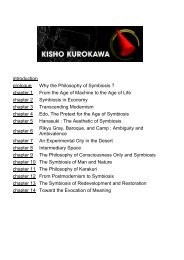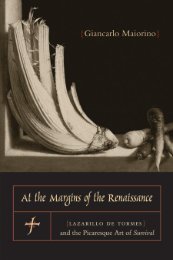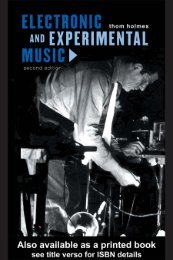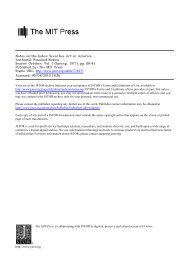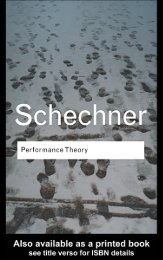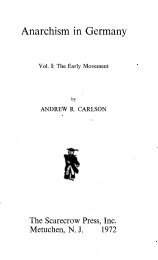Pieter Bruegel and the Art of Laughter - AAAARG.ORG
Pieter Bruegel and the Art of Laughter - AAAARG.ORG
Pieter Bruegel and the Art of Laughter - AAAARG.ORG
You also want an ePaper? Increase the reach of your titles
YUMPU automatically turns print PDFs into web optimized ePapers that Google loves.
notes to pages 23–24 171<br />
boerden; see Lodder 1996, esp. pp. 147, 161. Cf. Robrecht de Duyvel, a Ne<strong>the</strong>rl<strong>and</strong>ish<br />
prose romance published in 1516 after a French version. It can<br />
claim, perhaps, to be morally edifying, since it traces Robrecht’s career from<br />
Devil’s child to man <strong>of</strong> God, but <strong>the</strong> hero reaches his goal only after a series<br />
<strong>of</strong> less-than-edifying but highly entertaining adventures; see Rob Resoort,<br />
ed., Robrecht de Duyvel (Muiderberg: Dick Coutinho, 1980).<br />
64. See Lode Roose, Anna Bijns: Een rederijker uit de hervormingstijd, Koninklijke<br />
Academie voor Nederl<strong>and</strong>se Taal-en Letterkunde, VIe Reeks, Bekroonde<br />
werken, Nr. 93 (Ghent: Secretariaat van de Koninklijke Academie voor<br />
Nederl<strong>and</strong>se Taal-en Letterkunde, 1963), p. 342. For some erotic songs,<br />
with <strong>the</strong>ir many examples <strong>of</strong> wordplay <strong>of</strong> a sexual nature, in an Antwerp<br />
songbook <strong>of</strong> 1544, see Hermina Joldersma, “‘Het Antwerps Liedboek’:<br />
A Critical Edition,” 2 vols. Ph.D. diss., Princeton University, 1983,<br />
1:XCV–XCVII.<br />
65. Brussels, Bibliothèque Royale, La bibliothèque de Marguerite d’Autriche. Exposition,<br />
1940, p. 56, cat. no. 123.<br />
66. Pleij 1990, p. 96; Van Brouchoven possessed a copy <strong>of</strong> Johannes Pauli’s<br />
Schimpª und Ernst; see Van der Feen 1918, p. 90, no. 130. For <strong>the</strong> presence<br />
<strong>of</strong> such literature in Dutch libraries, see Van Stipriaan 1996, pp. 82–84,<br />
among <strong>the</strong>m Marnix’s copies <strong>of</strong> <strong>the</strong> Decameron in Italian ( p. 84).<br />
67. Quoted in Curtius 1953, p. 422: “Lo spirito allegro aquista più facilmente<br />
la perfezione christiana che non lo spirito malinconico.” Apparently a<br />
great humorist himself, Neri identified his favorite jest book as one by<br />
<strong>the</strong> fifteenth-century priest <strong>and</strong> fool Piovano Arlotto; see Beatrice K.<br />
Otto, Fools Are Everywhere: The Court Jester around <strong>the</strong> World (Chicago: University<br />
<strong>of</strong> Chicago Press, 2001), pp. 169–170.<br />
68. On <strong>the</strong> earthy sense <strong>of</strong> humor <strong>of</strong> <strong>the</strong> upper classes in this period, see<br />
Bowen 1998, pp. 14, 82; <strong>and</strong> for <strong>the</strong> seventeenth-century Dutch middle<br />
class in particular, E. de Jongh, “Jan Steen, So Near <strong>and</strong> Yet So Far,” in<br />
Washington-Amsterdam 1996, pp. 46–47.<br />
69. Burke 1978, p. 26.<br />
70. Welsford 1968, pp. 142–147.<br />
71. Nyeuwe clucht boeck 1983, pp. 67–68, nos. 22–24.<br />
72. Welsford 1968, pp. 144 <strong>and</strong> 283 respectively. For Tarleton, see also John<br />
Southworth, Fools <strong>and</strong> Jesters at <strong>the</strong> English Court (Phoenix Mill, U.K.: Sutton<br />
Publishing, 1995), pp. 108–109 <strong>and</strong> passim, esp. 114–117.


